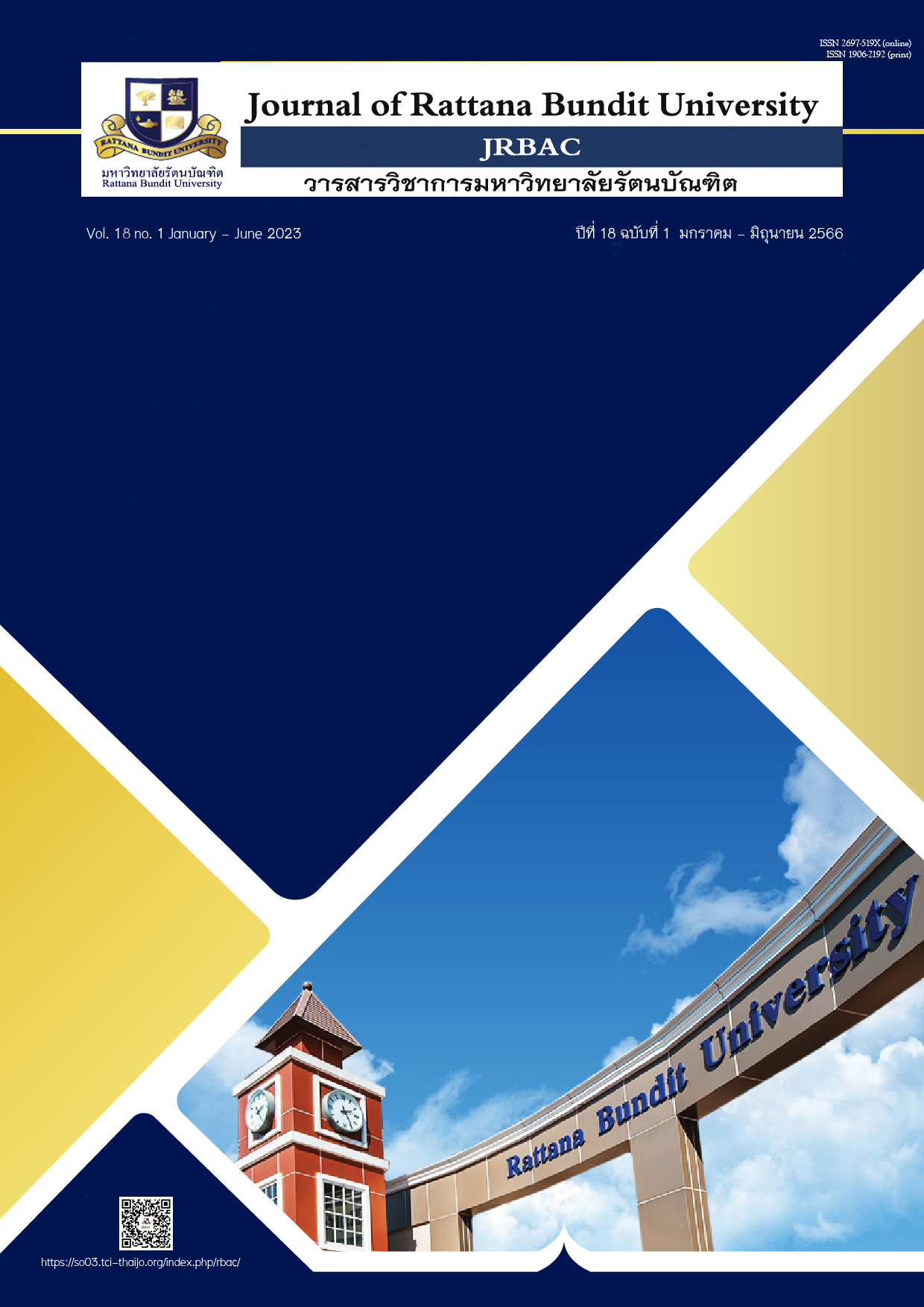การศึกษาอิทธิพลของปัจจัยเชิงสาเหตุที่มีต่อสมรรถนะหลักเฉพาะงานขาย ธุรกิจประกันวินาศภัยในประเทศไทย
Main Article Content
บทคัดย่อ
การศึกษานี้มีวัตถุประสงค์ 1) เพื่อศึกษาอิทธิพลทางตรงและทางอ้อมของปัจจัยเชิงสาเหตุ ได้แก่ ภาวะผู้นำยุคดิจิทัล การสร้างแบรนด์ภายในองค์กร และความไว้วางใจในองค์กรที่มีต่อสมรรถนะหลัก เฉพาะงานขายในธุรกิจประกันวินาศภัยในประเทศไทย 2) เพื่อพัฒนาโมเดลความสัมพันธ์เชิงสาเหตุของปัจจัยที่มีอิทธิพลต่อสมรรถนะหลักเฉพาะงานขายในธุรกิจประกันวินาศภัยในประเทศไทย การศึกษานี้เป็นการวิจัยเป็นแบบผสมผสาน โดยระยะแรกใช้วิธีวิจัยเชิงคุณภาพ เก็บข้อมูลกลุ่มผู้ให้ข้อมูลสำคัญจำนวน 15 ราย ซึ่งเป็นบุคคลที่มีความเกี่ยวข้องในการดำเนินธุรกิจประกันวินาศภัยในประเทศไทย โดยกลุ่มผู้ให้ข้อมูลสำคัญแบ่งเป็นสามกลุ่มคือ กลุ่มฝ่ายบริหารงานองค์กรธุรกิจประกันวินาศภัย จำนวน 5 คน กลุ่มบุคลากรฝ่ายขาย จำนวน 5 คน กลุ่มลูกค้าประกันวินาศภัย จำนวน 5 คน ใช้วิธีสุ่มอย่างแบบเฉพาะเจาะจงและแบบสัมภาษณ์แบบกึ่งโครงสร้างเป็นเครื่องมือ และระยะที่สองใช้วิธีวิจัยเชิงปริมาณ กลุ่มตัวอย่างคือบุคลากรฝ่ายขายประกันวินาศภัยจำนวน 413 คน การวิเคราะห์ข้อมูลใช้วิธีหาความสัมพันธ์เชิงสาเหตุ โดยใช้สถิติโมเดลสมการโครงสร้าง ด้วยโปรแกรมลิสเรล ผลการศึกษา พบว่า ปัจจัยที่สามารถสามารถอธิบายสมรรถนะงานได้มากที่สุดคือปัจจัยความไว้วางใจในองค์กร รองลงมาคือปัจจัยการสร้างแบรนด์ภายในองค์กร และปัจจัยภาวะผู้นำยุคดิจิทัลตามลำดับ ส่วนอิทธิพลทางตรงและทางอ้อมของปัจจัยเชิงสาเหตุได้แก่ ภาวะผู้นำยุคดิจิทัล การสร้างแบรนด์ภายในองค์กร และความไว้วางใจในองค์กรที่มีต่อสมรรถนะหลักเฉพาะงานขายในธุรกิจประกันวินาศภัยในประเทศไทย โมเดลสมรรถนะหลักเฉพาะงานขายตามทฤษฎีมีความเหมาะสมกับข้อมูลเชิงประจักษ์ โดยสมรรถนะหลักเฉพาะงานขายที่โดดเด่นที่สุดคือด้านการปรับปรุงการปฏิบัติงาน
Article Details

อนุญาตภายใต้เงื่อนไข Creative Commons Attribution-NonCommercial-NoDerivatives 4.0 International License.
เอกสารอ้างอิง
ธีรพล เจริญสุข และ แสงจิตต์ ไต่แสง. (2564). การพัฒนาสมรรถนะของบุคลากรกรมสรรพสามิตในเขตกรุงเทพมหานคร. วารสารวิชาการมนุษยศาสตร์และสังคมศาสตร์มหาวิทยาลัยราชภัฏพระนครศรีอยุธยา, 9(1), 75-96.
พรชัย ศักดานุวัฒน์วงศ์. (2563). ภาวะผู้นำที่รับผิดชอบต่อสังคมที่ส่งผลต่อความไว้วางใจของพนักงานในบริษัทที่มีการพัฒนาอย่างยั่งยืนของประเทศไทย. วารสารสมาคมนักวิจัย, 25(1), 285-302.
พัทธนนท์เปรมสมิทธ์, ชุลีวรรณ โชติวงษ์, สุภัททา ปิณฑะแพทย์, และปรีดา อัตวินิจตระการ. (2564). การพัฒนารูปแบบการบริหารของผู้บริหารสู่องค์การสมรรถนะสูงของสถาบันการเงินการธนาคาร. วารสารมนุษยศาสตร์และสังคมศาสตร์ มหาวิทยาลัยนครพนม, 11(2), 58-72.
รุ่งรัตน์ พลชัย. (2563). ภาวะผู้นำกับการบริหารในยุคดิจิทัล. วารสารมนุษยศาสตร์และสังคมศาสตร์ มมร. วิทยาเขตอีสาน, 1(3), 53-62.
วิรัตน์ ตรงพิทักษ์กุล และณัฐสพันธ์ เผ่าพันธุ์. (2564). การวิเคราะห์องค์ประกอบเชิงยืนยัน: ปัจจัยที่ส่งผลต่อสมรรถนะ และประสิทธิภาพการทำงานของที่ปรึกษาการเงินในอุตสาหกรรมประกันชีวิต. วารสารดุษฎีบัณฑิตทางสังคมศาสตร์, 11(1), 257 - 268.
ศิระ ศรีโยธิน. (2565). บทบาทของภาวะผู้นำการเปลี่ยนแปลงในแนวคิดการสร้างแบรนด์ภายในองค์กร. วารสารการจัดการ และการพัฒนามหาวิทยาลัยราชภัฏอุบลราชธานี, 9(1), 159-172.
สุวัฒน์ สุขสมฤทธิ์. (2563). ความสัมพันธ์ของการจัดการความรู้เทคโนโลยีสารสนเทศเพื่อสมรรถนะ บมจ.วิริยะประกันภัยในยุคไทยแลนด์ 4.0. วารสารรัฐศาสตร์มหาวิทยาลัยราชภัฏสวนสุนันทา, 3(1), 50-59.
หัสพร ทองแดง, ยุทธนา ไชยจูกุล, วิชุดา กิจธรธรรม, และพัชนี เชยจรรยา. (2561). กระบวนการสร้างและการสื่อสารแบรนด์ ภายในองค์กรกับพฤติกรรมการสนับสนุนแบรนด์ของพนักงานองค์กรเอกชนรุกตลาดอาเซียน 1. วารสารสถาบันเทคโนโลยีสุวรรณภูมิ (มนุษยศาสตร์และสังคมศาสตร์), 4(1), 274-290.
อดิศร คงพล และธัญนันท์ บุญอยู่. (2563). อิทธิพลของความพึงพอใจในงานในฐานะตัวแปรคั่นกลาง ที่เชื่อมโยงความไว้วางใจในองค์การสู่ผลการปฏิบัติงานของพนักงานบริษัทแห่งหนึ่งในนิคมอุตสาหกรรมมาบตาพุต. วารสารมนุษยศาสตร์และสังคมศาสตร์มหาวิทยาลัยเอเชียอาคเนย์, 4(1), 53-60.
อัญชลี ชัยศรี. (2563). การบริหารทรัพยากรมนุษย์บนพื้นฐานสมรรถนะ. วารสารวิชาการ มจร. บุรีรัมย์, 5(2), 234–248.
Al-Qadhi, A. (2021). Constructing competency model for Yemeni oil and gas operator & technicians based on training, assessment, motivation and the role of skilled pool experts. International Journal of Academic Research in Business and Social Sciences, 11(3), 1143–1161.
Ariani, M., & Zulhawati,ani Z. (2022). The Success factors of insurance marketers using the digital system of customer applications in insurance companies. In Tenth International Conference on Entrepreneurship and Business Management 2021 (ICEBM 2021), 538-545.
Asse, R. R., & Mhaibes, A. H. A. (2022). The effect of transformation leadership on core competency. World Bulletin of Social Sciences, 10, 34-47.
Chaisri, A. (2020). Human resource management based on competency. Academic MCU. Buriram Journal, 5(2), 234-248. (in Thai)
Chaosoun, T., Methiyothin, S. & Saleenukul, A. (2021). A Model of organizational leadership to develop highly effective followers. Journal of Politics, Administration and Law, 13(3), 224-239. (in Thai)
Charoensuk, T., & Taisang, S. (2021). Competency development for excise’s personnel in Bangkok. Journal of Humanities and Social Sciences, 9(1), 75 - 96. (in Thai)
Chiranonthakit, P. (2021). Human resource management in public sector with employer branding. Political Science and Public Administration Journal, 12(2), 269-294.
Chiva, R. (2022). Change and development in organizations: Towards consciousness, humanity and innovation. Routledge.
Choi, H. J., and Park, J. H. (2022). Exploring deficiencies in the professional capabilities of novice practitioners to reshape the undergraduate human resource development curriculum in South Korea. Sustainability, 14(19), 12121.
Creswell, J. W., & Plano Clark,V.L. (2017). Designing and conducting mixed methods research (3rd ed.). SAGE.
Hair, J. F., Black, W. C., Babin, B. J., & Anderson, R. E. (2019). Multivariate data analysis (8th ed). Cengage.
Jansuri, A., & Jadesadalug, V. (2020). The influence of trust towards the effectiveness of teamwork in service industry. Kasem Bundit Journal, 21(1), 1-12. (in Thai)
Kaur, P., Malhotra, K., & Sharma, S. K. (2020). Moderation-mediation framework connecting internal branding, affective commitment, employee engagement and job satisfaction: An empirical study of BPO employees in Indian context. Asia-Pacific Journal of Business Administration, 12(3/4), 327-348. https://doi.org/10.1108/APJBA-10-2019-0217
Kongpon, A., & Boonyoo, T. (2020). The effect of job satisfaction as intermediate variable coordinating organization trust to employee’s performance in Maptaphut Industrial Estate. SAU Journal of Social Sciences and Humanities, 4(1), 53-60. (in Thai)
Kriswijayanto, E. K., Yasin, M., & Sudiardhita, I. K. R. (2022). The influence of leadership style and capability dynamics of innovation work behavior: Competency and trust as mediation. Specialusis Ugdymas, 1(43), 2690-2715.
Matsui, K., Inoue, Y., Yanagawa, H., &Takano, T. (2021). A proposed model of core competencies for research ethics consultants. Asian Bioethics Review, 13(3), 355-370.
McKenna, E. (2020). Business psychology and organizational behavior. Routledge.
Office of Insurance Business Regulation and Promotion. (2021). Balance sheet table and profit statement. https://www.oic.or.th/th/consumer
Office of Insurance Commission. (2021). Insurance Development Plan No. 4 (2021-2025). https://shorturl.asia/2lgam
Phonchai, R. (2020). Leadership and administration in the digital age. Journal of Humanities and Social Sciences Mahamakut Buddhist University Isan Campas, 1(3), 53-62. (in Thai)
Premsmit, P., Chotiwong, C., Pinthapataya, S., & Attavinijtrakarn,P. (2021). The management model development for executives towards high-performance organization. Journal of Humanities and Social Sciences Nakhon Phanom University in Banking and Financial Institutes, 11(2), 58-72. (in Thai)
Sakdanuwatwong, P. (2020). Socially responsible leadership influencing employee’s trust at sustainable development companies in Thailand. Journal of the Association of Researchers, 25(1), 285-302. (in Thai)
Silverman, D. (2020). Qualitative research. SAGE.
Sriyothin, S. (2022). The role of transformational leadership in internal branding concept. Journal of Management and Development Ubonratchathani Rajabhat University, 9(1), 159-172.
Stoyanova, G. R. (2022). Banking insurance and future-sustainable insurance literacy. https://jei.uni-ruse.bg/Issue-2021/9.JEI-article-2021.pdf
Suksomrit, S., & Piemmetta, J. (2018). The relationship of knowledge management to human resources development of Viriyah Insurance Public Company Limited in Thailand 4.0. Journal of Arts Management, 2(3), 179–188. https://so02.tci-thaijo.org/index.php/jam/article/view/164987 (in Thai)
Thongdaeng, H., Chaijukul,Y., Kijtorntham,W. & Cheyjunya.P. (2018). Internal branding and communication on brand supporting behaviours of employees of private organization invading ASEAN market. Journal of Suvarnabhumi Institute of Technology (Humanities and Social Sciences), 4(1), 274-290. (in Thai)
Trongpitakkul, V., & Paopun, N. (2021). The confirmatory factor analysis: Factors affecting competency and job performance of financial advisors in the life insurance industry. Ph.D. In Social Sciences Journal, 11(1), 257–268.


